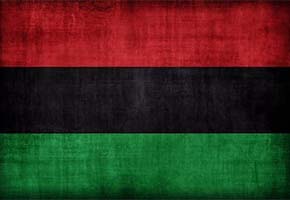Hi, CSUN Matadors! February is Black History Month, and the University library invites you to celebrate with this virtual book display. These books feature authors, leaders, and scholars with a focus on Black health and wellness. They address issues such as mental health among the Black community, and the history of and present climate for Black people in medical field.
All of the books within the Black History Month virtual display are electronically available through the University Library and require logging in with a CSUN User ID and password.

History
Blacks in Medicine: Clinical, Demographic, and Socioeconomic Correlations by Richard Allen Williams This socially conscious, culturally relevant book explores the little-known history and present climate of Black people in the medical field. Illustrated across ten expertly written chapters, this text features a longitudinal timeline with the presentation of evidence-based information drawn from historical, political, and clinical sources. The book begins with an analysis of diseases particularly prevalent in the Black community due to socioeconomic inequalities in available medical care. Bolstered by profiles of historically well-known Black physicians, stories of success in medical education, and the remarkable impact of Black medical organizations, subsequent chapters address the triumphs and tribulations of the Black medical professional in America. Concluding with an examination of the current health status of Black people in the United States, the book makes a case for future systemic improvements in healthcare delivery to minority communities.
She Can Bring Us Home: Dr. Dorothy Boulding Ferebee, Civil Rights Pioneer by Diane Kiesel Long before it became the slogan of the presidential campaign for Barack Obama, Dorothy Ferebee (1898–1980) lived by the motto YES, WE CAN. An African American obstetrician and civil rights activist from Washington DC, she advised presidents on civil rights and assisted foreign governments on public health issues. Though articulate, visionary, talented, and skillful at managing her publicity, she was also tragically flawed. Ferebee was president of the Alpha Kappa Alpha black service sorority and later became the president of the powerful National Council of Negro Women in the nascent civil rights era. She stood up to gun-toting plantation owners to bring health care to sharecroppers through her Mississippi Health Project during the Great Depression. A household name in black America for forty years, Ferebee was also the media darling of the thriving black press. Ironically, her fame and relevance faded as African Americans achieved the political power for which she had fought. This book tells Ferebee’s extraordinary story of struggle and personal sacrifice to a new generation.
Under the Strain of Color: Harlem’s Lafargue Clinic and the Promise of an Antiracist Psychiatry by Gabriel N. Mendes This book recaptures the history of Harlem’s Lafargue Mental Hygiene Clinic, a New York City institution that embodied new ways of thinking about mental health, race, and the substance of citizenship. The result of a collaboration among the psychiatrist and social critic Dr. Fredric Wertham, the writer Richard Wright, and the clergyman Rev. Shelton Hale Bishop, the clinic emerged in the context of a widespread American concern with the mental health of its citizens. Mendes shows the clinic to have been simultaneously a scientific and political gambit, challenging both a racist mental health care system and supposedly color-blind psychiatrists who failed to consider the consequences of oppression in their assessment and treatment of African American patients. Employing the methods of oral history, archival research, textual analysis, and critical race philosophy, Under the Strain of Color contributes to a growing body of scholarship that highlights the interlocking relationships among biomedicine, institutional racism, structural violence, and community health activism.
Mental Health
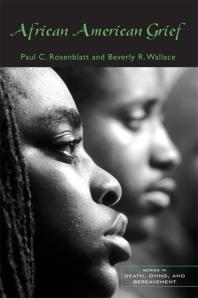 African American Grief by Paul C. Rosenblatt and Beverly R. Wallace This book is a unique contribution to the field, both as a professional resource for counselors, therapists, social workers, clergy, and nurses, and as a reference volume for thanatologists, academics, and researchers. This work considers the potential effects of slavery, racism, and white ignorance and oppression on the African American experience and conception of death and grief in America. Based on interviews with 26 African-Americans who have faced the death of a significant person in their lives, the authors document, describe, and analyze key phenomena of the unique African-American experience of grief. The book combines moving narratives from the interviewees with sound research, analysis, and theoretical discussion of important issues in thanatology as well as topics such as the influence of the African-American church, gospel music, family grief, medical racism as a cause of death, and discrimination during life and after death.
African American Grief by Paul C. Rosenblatt and Beverly R. Wallace This book is a unique contribution to the field, both as a professional resource for counselors, therapists, social workers, clergy, and nurses, and as a reference volume for thanatologists, academics, and researchers. This work considers the potential effects of slavery, racism, and white ignorance and oppression on the African American experience and conception of death and grief in America. Based on interviews with 26 African-Americans who have faced the death of a significant person in their lives, the authors document, describe, and analyze key phenomena of the unique African-American experience of grief. The book combines moving narratives from the interviewees with sound research, analysis, and theoretical discussion of important issues in thanatology as well as topics such as the influence of the African-American church, gospel music, family grief, medical racism as a cause of death, and discrimination during life and after death.
Black Mental Health: Patients, Providers, and Systems by Ezra E. H. Griffith, Billy E. Jones, and Altha J. Stewart Novel in its approach and unique in its scope, this book examines the role of African Americans within American psychiatric health care from distinct but interconnected perspectives. The experiences of both black patients and the black mental health professionals who serve them are analyzed against the backdrop of the cultural, societal, and professional forces that have shaped their place in this specialized health care arena. With its blend of scholarship, clinical insight, and training analysis, this book is compulsory reading both for trainees — as care delivery to minority groups is of ever greater importance — and practicing clinicians, who will glean useful information from the chapters on research advances and treatment modalities. Additionally, policy makers, educators, and historians, among others, will gain a better understanding of the challenges and necessity of developing integrated approaches to the care of nondominant groups.
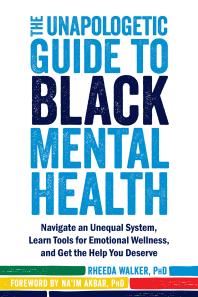 The Unapologetic Guide to Black Mental Health: Navigate an Unequal System, Learn Tools for Emotional Wellness, and Get the Help You Deserve by Rheeda Walker and Na’im Akbar An unapologetic exploration of the Black mental health crisis–and a comprehensive road map to getting the care you deserve in an unequal system. This book is an exploration of Black mental health in today’s world, the forces that have undermined mental health progress for African Americans, and what needs to happen for African Americans to heal psychological distress, find community, and undo years of stigma and marginalization in order to access effective mental health care. In this book, psychologist and African American mental health expert Rheeda Walker offers important information on the mental health crisis in the Black community, how to combat stigma, spot potential mental illness, how to practice emotional wellness, and how to get the best care possible in system steeped in racial bias. Whether you suffer yourself, have a loved one who needs help, or are a mental health professional working with the Black community, this book is an essential and much-needed resource.
The Unapologetic Guide to Black Mental Health: Navigate an Unequal System, Learn Tools for Emotional Wellness, and Get the Help You Deserve by Rheeda Walker and Na’im Akbar An unapologetic exploration of the Black mental health crisis–and a comprehensive road map to getting the care you deserve in an unequal system. This book is an exploration of Black mental health in today’s world, the forces that have undermined mental health progress for African Americans, and what needs to happen for African Americans to heal psychological distress, find community, and undo years of stigma and marginalization in order to access effective mental health care. In this book, psychologist and African American mental health expert Rheeda Walker offers important information on the mental health crisis in the Black community, how to combat stigma, spot potential mental illness, how to practice emotional wellness, and how to get the best care possible in system steeped in racial bias. Whether you suffer yourself, have a loved one who needs help, or are a mental health professional working with the Black community, this book is an essential and much-needed resource.
Black Women’s Issues
Gumbo for the Soul: Liberating Memoirs and Stories to Inspire Females of Color by Donna Y. Ford, Joy Lawson Davis, Michelle Trotman Scott, and Yolanda Sealey-Ruiz Our past and our future are intertwined. Each distinct memory becomes one life. What once hurt, eventually heals, and the lesson to be learned becomes one with our soul and our spirit. Our experiences provide strength instead of destruction. Our great-grandmothers, grandmothers, mothers — all women of power who came before us — were great descendants of the coastal lands of West Africa. They arrived in strange lands with their Gumbo – -their memories, rhythms, ingenuity, creativity, strength, and compassion. Their lived stories and conversation were recipes mixed with unique combinations of ingredients, dropped into the cast iron pot — stirred, dropped in, seasoned, dropped in, stirred again, and again, and again, until done. This Gumbo is savory like the soul, carefully prepared, recipes rich with what our foremothers brought with them from their homeland. They brought the best of what they had to offer.
Surviving in the Hour of Darkness: The Health and Wellness of Women of Colour and Indigenous Women by G. Sophie Harding et al. This book addresses the health issues – physical, mental, emotional, and spiritual – of Black women, First Nations women, and other women of colour. The book is a collection of scholarly essays, case studies, personal essays, poetry, and prose written by over 45 contributors. It illustrates, through the voices of many women, that gender, religious, cultural, and class background strongly influence how one experiences illness, how and when one is diagnosed, and how one is treated within the healthcare system. The book also focuses on the need for cultural sensitivity and inclusiveness in the delivery of health services.
Violence in the Lives of Black Women: Battered, Black, and Blue by Carolyn West Break the silence surrounding Black women’s experiences of violence! Written from a Black feminist perspective by therapists, researchers, activists, and survivors, this book sheds provides a forum where personal testimony and academic research meet to show you how living at the intersection of many kinds of oppression shapes the lives of Black women. With moving case studies, in-depth discussions of activism and resistance, and helpful suggestions for treatment and intervention, this book will help you understand the impact of violence on the lives of Black women. Topics you’ll find in this book include: using the arts to deal with sexual aggression in the Black community, racial aspects of sexual harassment, the consequences of head and brain injuries stemming from abuse, domestic violence in African-American lesbian relationships, strategies Black women use to escape violent living situations, lifelong effects of childhood sexual abuse on Black women’s mental health, and references and resources to help you learn more.
Racism and Medicine
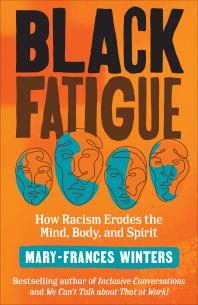 Black Fatigue: How Racism Erodes the Mind, Body, and Spirit by Mary-Frances Winters “Black people, young and old, are fatigued,” says award-winning diversity and inclusion leader Mary-Frances Winters. “It is physically, mentally, and emotionally draining to continue to experience inequities and even atrocities, day after day, when justice is a God-given and legislated right. And it is exhausting to have to constantly explain this to white people, even–and especially–well-meaning white people, who fall prey to white fragility and too often are unwittingly complicit in upholding the very systems they say they want dismantled.” This book, designed to illuminate the myriad dire consequences of “living while Black,” came at the urging of Winters’s Black friends and colleagues. Winters describes how in every aspect of life–from economics to education, work, criminal justice, and, very importantly, health outcomes–for the most part, the trajectory for Black people is not improving. It is paradoxical that, with all the attention focused over the last fifty years on social justice and diversity and inclusion, little progress has been made in actualizing the vision of an equitable society. Winters writes that “my hope for this book is that it will provide a comprehensive summary of the consequences of Black fatigue, and awaken activism in those who care about equity and justice–those who care that intergenerational fatigue is tearing at the very core of a whole race of people who are simply asking for what they deserve.”
Black Fatigue: How Racism Erodes the Mind, Body, and Spirit by Mary-Frances Winters “Black people, young and old, are fatigued,” says award-winning diversity and inclusion leader Mary-Frances Winters. “It is physically, mentally, and emotionally draining to continue to experience inequities and even atrocities, day after day, when justice is a God-given and legislated right. And it is exhausting to have to constantly explain this to white people, even–and especially–well-meaning white people, who fall prey to white fragility and too often are unwittingly complicit in upholding the very systems they say they want dismantled.” This book, designed to illuminate the myriad dire consequences of “living while Black,” came at the urging of Winters’s Black friends and colleagues. Winters describes how in every aspect of life–from economics to education, work, criminal justice, and, very importantly, health outcomes–for the most part, the trajectory for Black people is not improving. It is paradoxical that, with all the attention focused over the last fifty years on social justice and diversity and inclusion, little progress has been made in actualizing the vision of an equitable society. Winters writes that “my hope for this book is that it will provide a comprehensive summary of the consequences of Black fatigue, and awaken activism in those who care about equity and justice–those who care that intergenerational fatigue is tearing at the very core of a whole race of people who are simply asking for what they deserve.”
Inequality and African-American Health: How Racial Disparities Create Sickness by Shirley A. Hill This book shows how living in a highly racialized society affects health through multiple social contexts, including neighborhoods, personal and family relationships, and the medical system. Black-white disparities in health, illness, and mortality have been widely documented, but most research has focused on single factors that produce and perpetuate those disparities, such as individual health behaviors and access to medical care. This is the first book to offer a comprehensive perspective on health and sickness among African Americans, starting with an examination of how race has been historically constructed in the US and in the medical system and the resilience of racial ideologies and practices. Racial disparities in health reflect racial inequalities in living conditions, incarceration rates, family systems, and opportunities. Bringing together data from existing quantitative and qualitative research with new archival and interview data, this book advances research in the fields of families, race-ethnicity, and medical sociology.
Eliminating Race-Based Mental Health Disparities: Promoting Equity and Culturally Responsive Care Across Settings by Monnica T. Williams, Daniel C. Rosen, Jonathan W. Kanter, and Patricia Arredondo This book offers concrete guidelines and evidence-based best practices for addressing racial inequities and biases in clinical care. Perhaps there is no subject more challenging than the intricacies of race and racism in American culture. More and more, it has become clear that simply teaching facts about cultural differences between racial and ethnic groups is not adequate to achieve cultural competence in clinical care. One must also consider less “visible” constructs–including implicit bias, stereotypes, white privilege, intersectionality, and microaggressions–as potent drivers of behaviors and attitudes. In this edited volume, three leading experts in race, mental health, and contextual behavior science explore the urgent problem of racial inequities and biases, which often prevent people of color from seeking mental health services–leading to poor outcomes if and when they do receive treatment. In this much-needed resource, you’ll find evidence-based recommendations for addressing problems at multiple levels, and best practices for compassionately and effectively helping clients across a range of cultural groups and settings.
Subprime Health: Debt and Race in U.S. Medicine by Nadine Ehlers and Leslie R. HinksonThis book is an interdisciplinary exploration of race-based medicine. From race-based pharmaceutical prescriptions and marketing, to race-targeted medical “hot spotting” and the Affordable Care Act, to stem-cell trial recruitment discourse, this book is a timely examination of race-based medicine as it intersects with the concept of debt.
Self-care and Self-love
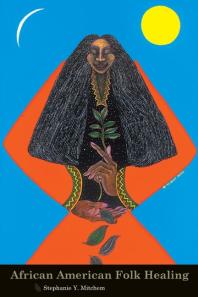 African American Folk Healing by Stephanie Mitchem Cure a nosebleed by holding a silver quarter on the back of the neck. Treat an earache with sweet oil drops. Wear plant roots to keep from catching colds. Within many African American families, these kinds of practices continue today, woven into the fabric of black culture, often communicated through women. Such folk practices shape the concepts about healing that are diffused throughout African American communities and are expressed in myriad ways, from faith healing to making a mojo. This book sheds light on how folk practices developed from the time of slavery through the Great Migrations, and how they have continued into the present. Through conversations with Black Americans, the author demonstrates how herbs, charms, and rituals continue folk healing performances. Mitchem shows that these practices are not simply about healing; they are linked to expressions of faith, delineating aspects of a holistic epistemology and pointing to disjunctures between African American views of wellness and illness and those of the culture of institutional medicine.
African American Folk Healing by Stephanie Mitchem Cure a nosebleed by holding a silver quarter on the back of the neck. Treat an earache with sweet oil drops. Wear plant roots to keep from catching colds. Within many African American families, these kinds of practices continue today, woven into the fabric of black culture, often communicated through women. Such folk practices shape the concepts about healing that are diffused throughout African American communities and are expressed in myriad ways, from faith healing to making a mojo. This book sheds light on how folk practices developed from the time of slavery through the Great Migrations, and how they have continued into the present. Through conversations with Black Americans, the author demonstrates how herbs, charms, and rituals continue folk healing performances. Mitchem shows that these practices are not simply about healing; they are linked to expressions of faith, delineating aspects of a holistic epistemology and pointing to disjunctures between African American views of wellness and illness and those of the culture of institutional medicine.
Black Is Beautiful: A Philosophy of Black Aesthetics by Paul C. Taylor This book identifies and explores the most significant philosophical issues that emerge from the aesthetic dimensions of Black life, providing a long-overdue synthesis and the first extended philosophical treatment of this crucial subject. It unites two areas of scholarship for the first time – philosophical aesthetics and Black cultural theory, dissolving the dilemma of either studying philosophy, or studying black expressive culture, brings a wide range of fields into conversation with one another- from visual culture studies and art history to analytic philosophy to musicology – producing mutually illuminating approaches that challenge some of the basic suppositions of each. Well-balanced, up-to-date, and beautifully written as well as inventive and insightful. Winner of The American Society of Aesthetics Outstanding Monograph Prize, 2017
 Reclaiming Our Health: A Guide to African American Wellness by Michelle A. Gourdine African Americans are affected by serious diseases and health conditions at far greater rates than other Americans.’In fact, African Americans suffer an estimated 85,000 excess deaths every year from diseases we know how to prevent: heart disease, stroke, cancer, high blood pressure, and diabetes. In this important and accessible book, Dr. Michelle Gourdine provides African Americans with the knowledge and guidance they need to take charge of their well-being. Dr. Gourdine begins with an overview of the primary health concerns facing African Americans and explains who is at greatest risk of illness. Expanding on her career and life experiences as an African American physician, Dr. Gourdine presents key insights into the ways African American culture shapes health choices—how beliefs, traditions, and values can influence eating choices, exercise habits, and even the decision to seek medical attention. She translates extensive research into practical information and presents readers with concrete steps for achieving a healthier lifestyle, as well as strategies for navigating the health-care system. This interactive guide with illustrations is a vital resource for every African American on how to live a healthier and more empowered life, and an indispensable handbook for health-care providers, policy makers, and others working to close the health gap among people of color.
Reclaiming Our Health: A Guide to African American Wellness by Michelle A. Gourdine African Americans are affected by serious diseases and health conditions at far greater rates than other Americans.’In fact, African Americans suffer an estimated 85,000 excess deaths every year from diseases we know how to prevent: heart disease, stroke, cancer, high blood pressure, and diabetes. In this important and accessible book, Dr. Michelle Gourdine provides African Americans with the knowledge and guidance they need to take charge of their well-being. Dr. Gourdine begins with an overview of the primary health concerns facing African Americans and explains who is at greatest risk of illness. Expanding on her career and life experiences as an African American physician, Dr. Gourdine presents key insights into the ways African American culture shapes health choices—how beliefs, traditions, and values can influence eating choices, exercise habits, and even the decision to seek medical attention. She translates extensive research into practical information and presents readers with concrete steps for achieving a healthier lifestyle, as well as strategies for navigating the health-care system. This interactive guide with illustrations is a vital resource for every African American on how to live a healthier and more empowered life, and an indispensable handbook for health-care providers, policy makers, and others working to close the health gap among people of color.
More resources from the Association for the Study of African American Life and History


